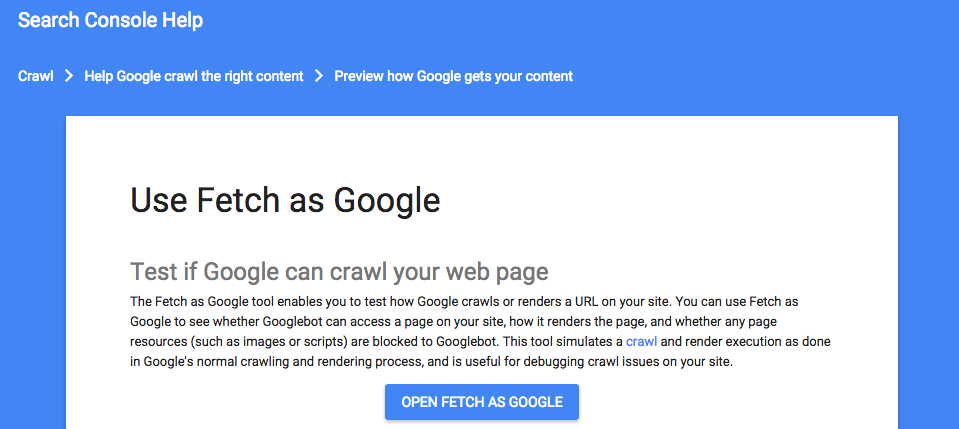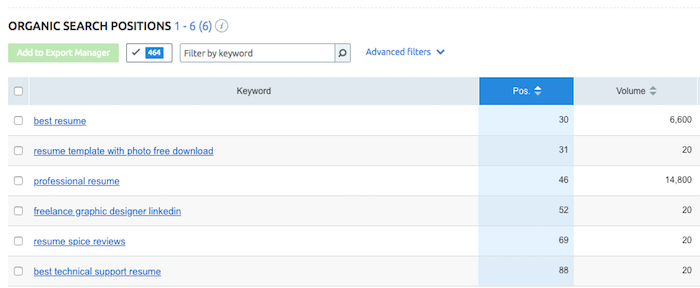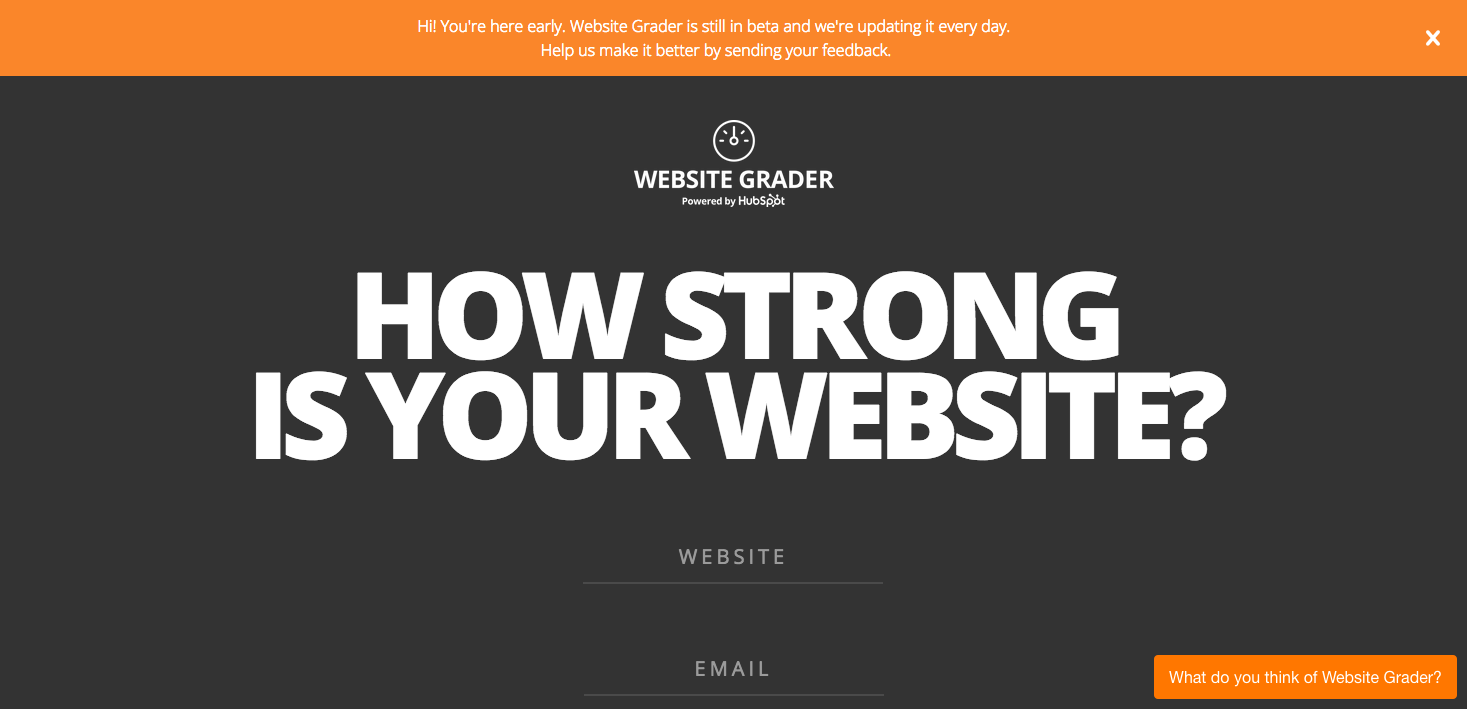SEO Monitoring Tools Google's Webmaster Tools SEMrush HubSpot's Website Grader Check My Links BuzzStream Moz's Pro Tools UpCity's SEO Report Card Woorank Screaming Frog's SEO Spider Found's SEO Audit Tool Remove'em Varvy's SEO Overview Tool 12 SEO Monitoring and Keyword Tools for 2018 1. Google's Webmaster Tools Purpose: Site Analysis Perhaps the best way to understand the way Google sees your site is to ask Google. For example, Google's Fetch as Google tool allows you to see a particular URL as Google sees it, which is critical when troubleshooting for poor SEO performance. Below is one of the toolkit's flagship features, allowing you to plug in a website page to see for what keywords it's ranking, what the page's rank is for that keyword, the keyword's monthly search volume, and more. HubSpot's Website Grader Cost: Free Purpose: Site Analysis Back in 2007, HubSpot released a tool called Website Grader that helped businesses uncover search engine optimization opportunities. SEO. Although backlinks to your website are critical to ranking well on Google, the outreach you do while link building can feel a lot like cold calling. Found's SEO Audit Tool Cost: Free Purpose: Site Analysis Want to rise above your competitors on search engine results pages? Varvy's SEO Overview Tool Purpose: Site Analysis This SEO auditing tool provides users with information regarding their domain strength, links, image SEO, social counts and mentions, page/technical SEO, page speed, and more. One the our favorite features is the detailed image overview: This section of the report focuses on the strength of the images your website employs by analyzing the alt text.

There’s nothing quite like a sudden Google algorithm update to leave marketers feeling equal parts confused and concerned. It seems like they wait for you to get all of your ducks in a row and then unleash an update that makes your efforts instantly obsolete.
Sure, they’re pretty open about that fact that they’re doing this for everyone’s own good — each algorithm tweak brings us one step closer to more relevant search results, after all. However, there is still some secrecy behind exactly how Google evaluates a website and ultimately determines which sites to show for which search queries.
That said, there are a number of tools out there — some free, some paid — that help you to look at your own site the way that Google sees it.
These tools are critical to your organic search strategy because they allow you to focus on the elements of your site that Google deems important. In this post, we’ll walk through 10 such tools that all help you run a site analysis like a marketer … and a Google bot!
SEO Monitoring Tools
- Google’s Webmaster Tools
- SEMrush
- HubSpot’s Website Grader
- Check My Links
- BuzzStream
- Moz’s Pro Tools
- UpCity’s SEO Report Card
- Woorank
- Screaming Frog’s SEO Spider
- Found’s SEO Audit Tool
- Remove’em
- Varvy’s SEO Overview Tool
12 SEO Monitoring and Keyword Tools for 2018
1. Google’s Webmaster Tools
Purpose: Site Analysis
Perhaps the best way to understand the way Google sees your site is to ask Google. Google’s Webmaster Tools are novice-friendly resources that explain the fundamentals of Google search.
For example, Google’s Fetch as Google tool allows you to see a particular URL as Google sees it, which is critical when troubleshooting for poor SEO performance. The information returned can help you modify the page in question for better results, and can even help you isolate problematic code when you believe your site’s been hacked.

Another great feature of Google Webmaster Tools is PageSpeed Insights. This SEO tool measures the performance of both your desktop and mobile site in terms of speed. With mobile search queries surpassing desktop searches, page speed is becoming increasingly important to businesses that want to hold on to their visitors.
“PageSpeed Insights evaluates how well a page follows common performance best practices and computes a score from 1-100 that estimates its performance headroom,” according to Google Developers. That score can be Good, as in 80 or above; Medium, as in 60 to 79; or Low, as in 0 to 59.
2. SEMrush
Purpose: Keyword Research
SEMrush is a super elaborate dashboard that reports on the performance of domains as a whole and their specific pages. The website offers numerous toolkits, one of which is an SEO toolkit.
Below is one of the toolkit’s flagship features, allowing you to plug in a website page to see for what keywords it’s ranking, what the page’s rank is for that keyword, the keyword’s monthly search volume, and more.

The rest of the SEO toolkit allows you to compare your page performance to competition, analyze backlinks from other websites to your site (also known as link building), research appropriate keywords, and take advantage of similar on-page SEO opportunities.
3. HubSpot’s Website Grader
Cost: Free
Purpose: Site Analysis
Back in 2007, HubSpot released a tool called Website Grader that helped businesses uncover search engine optimization opportunities. Because a lot has changed since then, the company has released a new and improved version of the tool.

Website Grader is an online tool that generates personalized reports based on the following key metrics:
- Performance. The tool will analyze your site’s page size, requests, speed, and similar key SEO metrics.
- Mobile Readiness. The tool will see if your website is mobile-friendly in terms of responsiveness and viewport settings.
- SEO. The tool will determine if your website is easy to find — both by humans and bots. This determination will take factors like page titles and meta descriptions into consideration.
- Security. The tool will look for things like an SSL certificate. This serves as a way to prove to visitors that your site is both authentic and safe for contact information submissions.
All you need is your website URL and an email address to get started. Simply plug in your information and you can expect a score (1-100) as well as a detailed report in a matter of seconds.
Aside from Website Grader, HubSpot also has a handful of paid SEO tools to help you better direct your efforts.
For example, within the HubSpot Blogging App, users will find as-you-type SEO suggestions. This helpful inclusion serves as a checklist for content creators of all skill levels. HubSpot customers also have access to the Page Performance App, Sources Report, and the Keyword App. The HubSpot Marketing Platform will provide you with the tools you need to research keywords, monitor their performance, track organic search growth, and diagnose pages that may not be fully optimized.
4. Check My Links
Cost: Free
Purpose: Link Optimization
To ensure that your links on a webpage — whether external or internal — actually work, consider Check My Links.
This broken-link checker makes it easy for…

COMMENTS